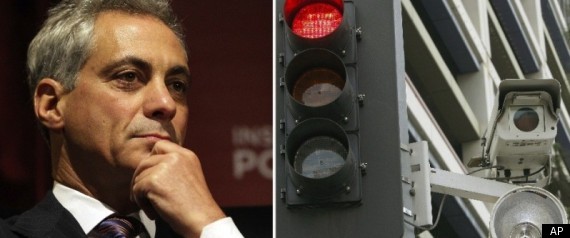David Kidwell and Bill Ruthhart
Chicago Tribune
August 11, 2013
As Mayor Rahm Emanuel rolls out his long-delayed speed camera plan, new numbers his office released suggest that drivers who speed in Chicago could rack up way more in fines than a cash-starved City Hall initially projected.
The mayor had hoped to bring in $30 million this year. But results from a monthlong test of the automated camera system indicate the city could reap well into the hundreds of millions of dollars in the program’s first year.
City transportation officials argue that estimate is overblown, but the test period statistics the mayor’s office released Friday reinvigorated critics who argue that the program is more of a cash grab than the child safety measure Emanuel sold it as.
The look at the potential impact on drivers comes as the city prepares to install the first cameras at four neighborhood parks Monday. An additional eight locations, including three near schools, are scheduled for next month.
As the city announced the camera work would begin, it released figures that provide the only real insight so far into the magnitude of a program that will hit motorists in their wallets for at least the next five years. During a December trial, the two companies vying for the contract clocked more than 93,000 speeders at four locations.
The number of potential citations came as a surprise to even the city’s speed camera operator.
“I think everyone was shocked at the numbers,” said Charles Territo, a spokesman for American Traffic Solutions. “It became very obvious there is a speeding problem in school and park zones in the city of Chicago.”
Had tickets been issued for all of those test-period violations, the city could have collected about $4.7 million in ticket revenue in a single month.
The city plans to have 50 camera locations up and running by year’s end. If each of those locations sticks to the pattern the test cameras found, the city could rake in hundreds of millions of dollars a year. Here’s the math: Take the average of nearly $1.2 million per month at each location and multiply it by 12 months and 50 locations. The windfall doesn’t end there — state law allows Emanuel to install cameras at up to 300 locations in specially designated school and park zones.
City transportation officials put estimated first-year revenues at $40 million to $60 million, arguing that several factors will cut down on the number of tickets actually issued.
For starters, they argue that it’s incorrect to estimate revenues based on the test program. They suggest the money will never reach into the hundreds of millions of dollars because of a number of factors. The most important: the fast learning curve of Chicago drivers.
“We are going to see a dramatic change in the way people behave and the way people drive,” said Scott Kubly, the city transportation official who oversees the program. He said the city is embarking on a huge education campaign, will post signs to warn drivers and will issue only warning tickets for the first 30 days.
In addition, about 10 percent of the recorded violations are typically not enforceable for numerous reasons — the speeders were emergency vehicles, the license tags were obscured or there’s no child in the photo the camera takes in a school zone.
Beyond that, the city typically collects only 70 percent of the money from tickets that are issued because some drivers simply don’t pay up. Kubly also pointed out that the four test locations were chosen because of their high traffic volume. Others might not have so many cars pass through.
ATS was one of two companies that conducted the tests from Dec. 3 to Jan. 3. It installed four cameras at two locations: Dulles Elementary School at 6311 S. Calumet Ave. and Warren Park at 6500 N. Western Ave. The company recorded 546,979 passing vehicles during enforceable safety zone hours and snapped photos of 51,701 violations, nearly 1 in 10.
The other company competing for the contract, Xerox State & Local Solutions, recorded 41,540 potential speeding violations of 503,366 passing cars at two locations: McKinley Park, 2223 W. Pershing Road, and Near North Montessori School, 1446 W. Division St.
Violators will be warned for the first month and then will get a warning ticket after the first violation. After that, anyone caught going 11 mph or more over the limit will get a $100 ticket by mail. Those going 6 to 10 mph over the limit will get a $35 ticket. Kubly said about 23 percent of the potential violations during the test were more than 10 mph over the limit.
Ald. Leslie Hairston, 5th, who voted against the speed camera program, said the number of speeders captured on the test cameras supports her insistence that the main motivation is to generate more city revenue.
“I guess this is just going to be a city for wealthy people, that’s where we’re headed,” she said
 Daily Stormer The Most Censored Publication in History
Daily Stormer The Most Censored Publication in History



